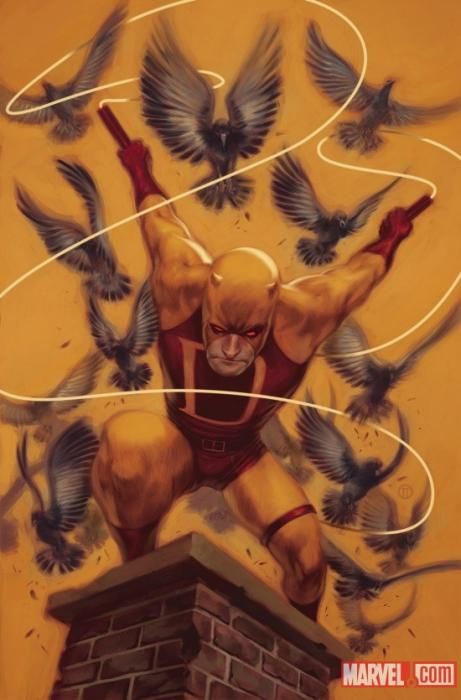Marvel's Season One graphic novels have thus far been enjoyable (if frothy) introductions to their stars, with straightforward, digestible writing and consistently pretty art. "Daredevil: Season One" by Anthony Johnston and Wellington Alves maintains this standard, hitting a strong balance between introducing new readers to the character and entertaining those with little knowledge of him.
Unlike the most popular origin-retelling of Daredevil (Frank Miller and John Romita's unassailable "Man Without Fear" miniseries), "Season One" concentrates not on the genesis of Murdock's heroism, but on the beginnings of his career as a costumed vigilante. A sort-of Daredevil: Year One. A wider story about a possibly corrupt councilman and a Priest who needs help dovetails with Daredevil's early and more obviously superheroic encounters against the likes of the Eel, Ox and The Owl, giving equal time to both sides of Daredevil's crime-fighting: as superhero and lawyer.
As an introduction for new readers, however, it can't help but miss out some of the more powerful elements of the character. The tone of the book is nothing like the relentlessly dark Millar/Bendis eras and similarly, the overt swashbuckling of the Everett/Waid eras has been toned down in favor of a more even feel. It doesn't harm the story, which is well-constructed and comprehensive in its treatment of the traditional Daredevil cast and themes, but existing fans may feel that the character has been diluted.
Alves' work is an appropriate choice for the format, making use of clear layouts and unambiguous storytelling. His sense of space and movement is an undeniable asset for a character like Daredevil, whose visual appeal relies on acrobatics. Alves and Johnston do take great lengths to visualise Murdock's sense-based powers, utilising a more cinematic approach than the current series. Indeed, such visual simplicity means there's an all-ages vibe to much of the work, but its technical innocence is a smart choice for a book aimed at non-comics readers. The numerous cameos and mentions of other Marvel Universe heroes is also sure to broaden its appeal, given the less saleable protagonist.
If there's any problem with the Season One books, it's that the stories seem to have no subtext or point beyond introducing the characters. Johnston does dabble with fear as a theme, but it seems superficial. Daredevil's dual identities -- law-enforcer/vigilante, catholic/devil, blind/superhuman -- are what make him a compelling character and here there's little conflict between those sides of his personality.
It's a fun adventure for the character, but it's less a story about Daredevil than it is the first part of his story. The idea, presumably, is to lay the groundwork so that readers can explore more by reading the rest of his published career, and in that sense it's a success -- but if you're familiar with the character already, don't expect anything other than an enjoyable retelling of his early adventures.

